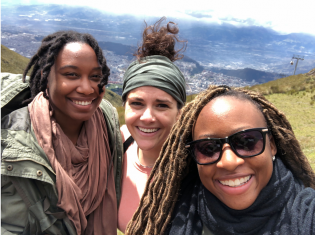Georgia Southern school psychology students work with special needs children in Ecuador, experience is life-changing

Over the summer, three Georgia Southern University students traveled to Quito, Ecuador, to participate in the Ecuador Professional Preparation Program (EPPP), an 18-day cultural immersion program for psychology graduate students and mental health professionals. Brittany Fahey, Shanice Murphy and Raven Patterson, all students in the College of Education’s Education Specialist (Ed.S.) in School Psychology program were three of 30 students from around the world selected to participate in the experience that they described as nothing short of life-changing.
EPPP invites participants to contribute to the organization’s mission of advancing the fields of psychology and mental health in Ecuador while gaining knowledge of the country’s psychological and educational practices, as well its culture.
“This experience helped me to develop both personally and professionally,” said Murphy. “I was able to receive first-hand experience immersed in the culture of Ecuador that I could not have received from just reading a textbook or completing an internet search.”
However, she admitted, the trip was not always easy.
“There were times when I became frustrated due to the language barrier and adjusting to cultural norms,” Murphy said. “In return, these challenges opened my eyes to the lives English-Language Learner students live every single day in the United States.”
Each participant in the program was housed with a local host family, mentored in an educational or mental health work environment and received one-on-one Spanish tutoring.
“I experienced what it was like to be an adult in a foreign country and struggled tremendously,” said Fahey. “I have a newfound respect for children and their families living in the United States whose second language is English.”
Murphy and Fahey volunteered at El Jardín, a preschool with children ranging in age from six months to five years old.
“Special education is not a common service offered in most Ecuadorian cities,” Murphy explained. “Most children with disabilities are placed in classrooms with the general population and have little to no services offered for them. There are a few schools for children with disabilities available in some areas that offer such services, but for some families, it can be hard to enroll their children depending on where they are located and if there is space available.”
Patterson was placed at NeuroLogic International, a treatment center for neurological and mental diseases, where she was able to learn about the history of mental health in Ecuador and the plans to improve mental health stigma in the country.
“NeuroLogic International plans to expand and educate their communities on mental health practices and therapies to treat mental illnesses,” said Patterson. “Many of the Ecuadorian citizens are hesitant to use mental health services because of the stigma in their communities, and the country faces a lack of resources for mental health.”
All three students agreed that the program enhanced their understanding of culturally diverse students and will impact their future roles as school psychologists.
“Cultural competence is a necessary component when communicating needs and wants in an educational setting,” said Patterson. “As a graduate student in the school psychology program, I want to remain competent and empathetic to the unique individual needs of students.”
Fahey walked away with a new outlook on life.
“I’ve gotten something out of this that I will carry with me forever as a school psychologist,” Fahey said. “The experience was not fun. It was challenging. It was frustrating and scary at times, but it pushed me in ways I would never have been pushed if I was not there.”
The Ed.S. in School Psychology at Georgia Southern requires students to complete field experiences in a school setting under the supervision of a certified school psychologist in their practicum course and in professional internship experiences. Fahey, Murphy and Patterson completed this program as an additional experience to shape and inform their studies while at the University and as future school psychologists.
Georgia Southern University, a public Carnegie Doctoral/R2 institution founded in 1906, offers 141 degree programs serving nearly 26,500 students through nine colleges on three campuses in Statesboro, Savannah, Hinesville and online instruction. A leader in higher education in southeast Georgia, the University provides a diverse student population with expert faculty, world-class scholarship and hands-on learning opportunities. Georgia Southern creates lifelong learners who serve as responsible scholars, leaders and stewards in their communities. Visit GeorgiaSouthern.edu.
Posted in Press Releases, Research

